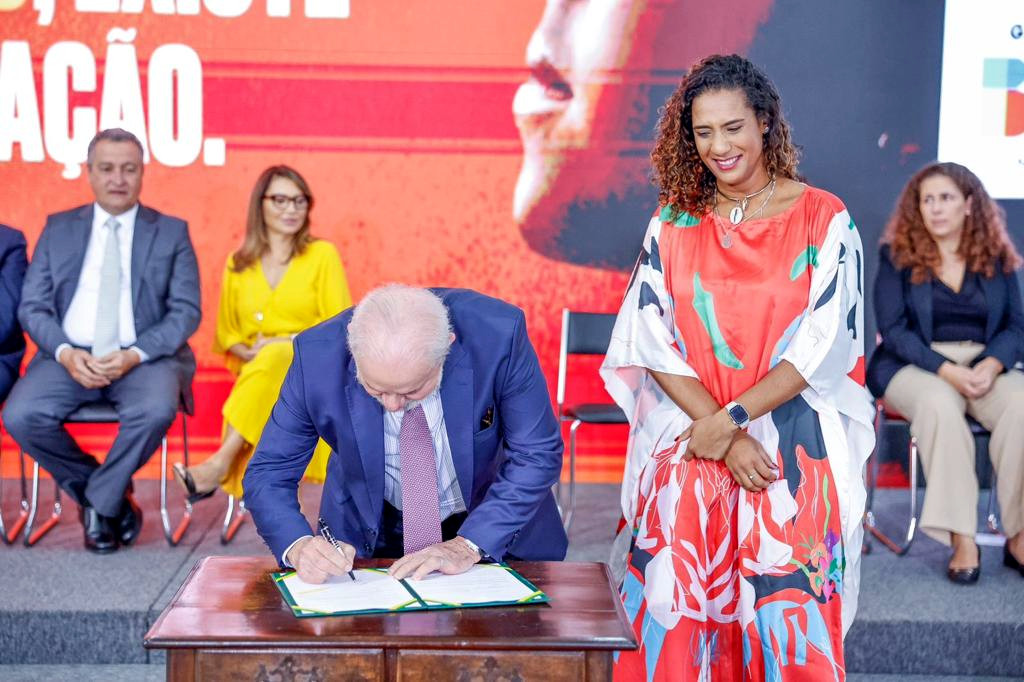Brasilia. The Brazilian President Lula da Silva has prepared a “package of measures to combat racism” together with the Ministry of Ethnic Equality and at the Presidential Palace announced. With the establishment of the ministry, which is now headed by the former activist Anielle Franco, President Lula set an example at the beginning of his first term in office in 2003.
The decree for a “black quota” among government employees attracted national and international attention. Accordingly, by the end of 2025 at least 30 percent of management and decision-making positions in the ministries and higher administrative levels should be held by black people occupied become. Lula has repeatedly stressed that his government should reflect “the face of Brazilian society”. According to the National Institute of Geography and Statistics designated around 54 percent as black in 2021.
In addition, Lula and Franco presented the following measures: The establishment of an inter-ministerial working group for a new “national program for affirmative action”. The program is primarily intended to improve the access and retention of black students in the education system. Another action plan, “Juventude Negra Viva,” aims to help reduce the high suicide rate among black youth.
An interministerial “Cais do Valengo Working Group” is given the task of setting up a “Documentation Center for African Heritage”. The Valengo quay is a former dock at the port of Rio de Janeiro, which was recognized as a World Heritage Site in 2017. Until the Atlantic slave trade was banned According to estimates, up to a million enslaved people were dragged ashore at what is now an archaeological site.
Finally, the “Aquilomba Brasil” program aims to improve the rights, infrastructure and quality of life of the residents of former Quilombos. In the days of slavery, quilombos were small villages and settlements of enslaved people or escaped slaves, which often became nuclei of resistance. The program is intended to work inter-ministerially and benefit around one million former Qilomba residents.
“Racism is at the root of inequalities, so we must eradicate it like the vermin in our plants”, said Lula presenting the measures. “No country is a democracy as long as the color of the people’s skin determines the opportunities they have throughout life,” Lula continued. It is the task of the state to “guarantee the same opportunities for everyone,” explained the left-wing politician, who was elected to the presidency for the second time in October.
Brazil was the last country on the South American continent to abolish slavery in 1888. It has the largest Black population groups outside of Africa, but they are structurally underrepresented in the elites. According to a survey cited by Le Monde, in 2021 only about five percent of senior executives at Brazil’s 500 largest companies were Black or from an ethnic minority. According to one conducted by the State University of Rio de Janeiro Study In 2020, only ten percent of the students in the 20 best Brazilian private schools were black.
At the ceremony marking the announcement of the package of measures, the “Special Secretariat for Promoting Ethnic Equality” set up in early 2003 – during Lula’s first term in office – was remembered. Among other things, it was responsible for including the history of African and Afro-Brazilian cultures in the primary school curriculum and for introducing quotas for graduates from public secondary schools at universities. The responsible minister Franco, who herself visited the State University of Rio de Janeiro thanks to the quota laws, acknowledged these measures as groundbreaking for the black population.
Lula took the opportunity to criticize his predecessor Jair Bolsonaro. The latter pursued a policy of “returning to the colonial past”. After his narrow election defeat, Bolsonaro is still considered influential in Brazilian politics.
